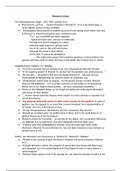Richard III Critics
The Shakespearean Stage, 1574-1642, Andrew Gurr
● Mad women, such as … Queen Elizabeth in Richard III, wore long-haired wigs, a
fairly realistic symbol of their condition.
● “Shakespeare had produced a detailed account of over-acting much earlier than this
in Richard III, where Buckingham says contemptuously:
“Tut, I can counterfeit the deep tragedian,
Speak and look back, and pry on every side,
Tremble and start at wagging of a straw:
Intending deep suspicion, ghastly looks
Are at my service, like enforcéd smiles;
And both are ready in their offices,
At any time, to grace my stratagems.
We might well suspect that academic teaching of pronunciation and
gesture was less useful to either the boys or the adults than a direct eye on nature.
Shakespearean Tragedy, A C Bradley
● “The hero contends with an outward force, but comparatively little with himself.”
● “In the opening speech of Richard III, we feel that the speakers are addressing us…”
● “No one who… remembers that one end awaits Richard III… will ever accuse
Shakespeare of representing the ultimate power as ‘poetically’ just.”
● “Shakespeare makes here an appeal… he introduces scenes of battle. Richard…
[dies] on the battlefield. ...it is a curious comment on the futility of our spectacular
effects that in our theatre these scenes… are even somewhat distasteful.”
● Death on the battlefield allows us “to mingle sympathy and enthusiastic admiration
with desire for their defeat.”
● “... human nature assumes shapes which inspire not mere sadness or repulsion but
horror and dismay.”
● “His physical deformity seems to offer some excuse for his egotism. In spite of
egotism, too, he appears to us more than a mere individual; he is representative of
his family, the Fury of the House of York.”
● “He has strong passions, admirations, and his conscience disturbs him.”
● “Though an excellent actor, he prefers force to fraud, and in his world there is no
general illusion as to his true nature.”
● Richard’s deformity “furnishes… no excuse for his villainy, but it somewhat influences
our feelings. It is no fault of his, and yet it separates him from other men.”
● “It seems clear that Shakespeare's interest, since the early days when under
Marlowe’s influence he wrote Richard III., has not been directed to more extreme or
terrible forms of evil.”
History, the Character and Conscience in “Richard III”, Richard P. Wheeler
● “Richard is the scourge of god, his actions, however evil serve a divinely ordained
end.”
● ‘Through Richard’s victims, the prospect of peace becomes fused with false hope
and deception, as in the sickening irony of King Edward’s wish to leave behind a
united kingdom”
● “Richard makes peace a tool of his savage wit, and uses the promise of peace in his





